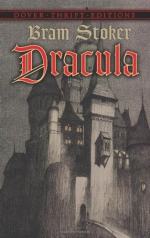|
This section contains 444 words (approx. 2 pages at 300 words per page) |

|
SOURCE: “Recent Novels.” Spectator (31 July 1897): 150-51.
In the following review, the anonymous critic asserts that the strength of Dracula lies in Stoker's vivid imagination.
Mr. Bram Stoker gives us the impression—we may be doing him an injustice—of having deliberately laid himself out in Dracula to eclipse all previous efforts in the domain of the horrible,—to “go one better” than Wilkie Collins (whose method of narration he has closely followed), Sheridan Le Fanu, and all the other professors of the flesh-creeping school. Count Dracula, who gives his name to the book, is a Transylvanian noble who purchases an estate in England, and in connection with the transfer of the property Jonathan Harker, a young solicitor, visits him in his ancestral castle. Jonathan Harker has a terrible time of it, for the Count—who is a vampire of immense age, cunning, and experience—keeps him as a...
|
This section contains 444 words (approx. 2 pages at 300 words per page) |

|


